Corona policy set by the European Commission
In March 2020, the IPCR mechanism was activated by Brussels. Together with the existing European consultation structure of the HSC, the covid response was aligned among the European member states.
A central question about the international covid response remains unanswered: Why does the crisis response of different countries with autonomous administrations seem so aligned and how did this come about? With a few exceptions such as Sweden's approach, many countries took the same measures during the same period.
On March 1, 2020, the European Commission (EC) activates the Integrated Political Crisis Response (IPCR) in Full Activation Mode. This means that the body at the political level has regular coordination on imminent measures in order to align them.
The Health Security Committee (HSC) is an existing consultative structure of varying composition. Here, health topics are discussed and coordinated between European member states on a more substantive level.
Input from the HSC is used in the IPCR. Topics from the IPCR are then discussed within the European Council (ER). From this, council recommendations emerge.
So in a sense, the HSC is the source of much of the corona policy pursued by member states, but again this committee is influenced by a small advisory panel of experts. Among others, Marion Koopmans, Christian Drosten and Peter Piot are part of this advisory panel. This is where the imposed measures are devised at an early stage of the pandemic.
The HSC, IPCR and ER seem to have a democratic and informative character, but released FOIA (Freedom Of Information Act) documents show that practice is more recalcitrant. There is robust lobbying to drive common decisions from the national interest. When this is insufficiently successful, European policy is nevertheless adopted within the member states. Thus the policy devised by the small group of experts finds its way to the crisis organizations of the national governments. These crisis organizations are in many cases in the hands of military and intelligence services.
Corona measures such as the Corona Entry Permit (CTB), entry restrictions, quarantine rules, zoonosis testing, germ surveillance and other interventions are implemented according to the European model. Even when this is inconsistent with the Dutch advice of the RIVM.
After studying released FOIA documents and meeting minutes, a striking picture emerges of a select group of experts who, under the leadership of Ursula von der Leyen, land corona policy within national crisis management via European meeting forums. In the case of the Netherlands, that is the National Coordinator for Counterterrorism and Security (NCTV).
Because the experts also play a role within national policy by serving on advisory bodies such as the Outbreak Management Team (OMT) and the Health Council (GR), they are able to validate the advice they issue from the EC through likeminded or supportive advice given by the national bodies to local crisis management.
NCTV represents the Netherlands in full activation IPCR
On March 1, 2020, the European Commission will activate the IPCR in "full activation mode. The IPCR is a high official body that can operate in three modes: Monitoring, Information sharing and Full Activation. The difference of full mode with information sharing only is in two aspects: There are periodic crisis consultations between ministers and ambassador of member states, and proposals for European actions. The IPCR is also active in connection with other crises such as the migration crisis, for example. In 2022, the IPCR is also in Full Activation mode because of the war in Ukraine. This may explain the flush response of member states to all developments.
The full activation of IPCR under Covid-19 is first submitted within the member states by the then Croatian president.
The Netherlands agrees to the full activation and let it be known on February 28.
The operation of the crisis mechanism and cooperation among themselves means that the Health Security Committee (HSC) discusses current affairs and developments in the European context on a substantive level. The issues are then fed into the IPCR. This leads to recommendations from the European Council that member states are expected to follow. The Council recommendations are formally non-binding, but as will be seen later, they have a formal character and one must be of good character to implement a policy that conflicts with the outcomes of the HSC, IPCR and European Council.
On the same day that the Netherlands indicates agreement with the full mode of the IPCR, a report appears within the Ministry of Justice and Security (J&V) on the current situation in the Netherlands. This shows that the HSC has already developed scenarios for the continuation of the outbreak.
Notable are the views of the RIVM, which, like the German RKI, takes a rather rational approach to the effects of the new virus. Covid-19 shows very similarities to normal flu. Despite the initially high mortality rate reported, it appears that the actual danger will be much lower for several reasons.
Shortly after the activation of full mode, an email circulates within the ministries in which J&V emphasizes the Dutch autonomy in making decisions.
In the Netherlands, the National Coordinator for Counterterrorism and Security (NCTV) leads the crisis response. From this capacity, the intelligence service plays a role within the IPCR. Streamlining information sharing within departments and coordinating the process are among its responsibilities.
Within the Ministry of Health, Welfare and Sport (VWS), an email on April 23 speaks of a dependence on what the NCTVs report within the European Union (EU), without always being in contact with the Ministry of VWS about this.
In the Netherlands, the NCTV plays a key role in managing the crisis. In addition to coordinating European relations and daily management of the crisis organization, the terrorism watchdog has also established a team to streamline Dutch parliamentary processes. In our house of democracy, party factions are not supposed to surprise each other with in all likelihood motions or amendments. The intelligence service has even set up an entire team for this, according to a March 14, 2020 report.
The political representative of the Netherlands within the EU has limited opportunities to put issues on the agenda or substantiate them. Setting a truncated speaking time and a limit on the number of topics enforces a certain decisiveness and prioritization among member states.
From a preparatory email circulated within the ministries on April 5, 2020, it appears that concessions must be made on the topics and the weight given to them on behalf of the Netherlands.
The role of the Health Security Committee
The Health Security Committee (HSC) is a body that periodically consults on a variety of public health issues. The HSC has a more substantive character than the IPCR.
During the Covid-19 crisis, within the health ministry, the HSC was considered a "pre-wash" for the IPCR. This is evident from mail exchanges from November 2020.
In practice, however, the substantive nature of the HSC proves disappointing.
The HSC is often political, when it should be technical. Nevertheless, the consultative structure is seen as the most efficient forum.
Within the HSC, corona measures are discussed and streamlined where necessary. The VWS situation report explains this and concludes with the sentence, "Ultimately, of course, it is the member states who decide whether or not to implement measures. This side sentence recurs with greater frequency in the FOIA documents than should be necessary with such obviousness.
Marion Koopmans on advisory panel Ursula vd Leyen
As of March 17, 2020, the HSC is being advised by a team of scientific experts established two days earlier, according to a situation report from VWS. When trying to find out who these experts are via the European Commission's site, one is referred to a deleted Web page. However, the page can still be accessed via Webarchive's Internet archive. Clicking through to the Scientific Advisory Panel page, one learns that Dutch OMT member Marion Koopmans is a member of the European Advisory Group.
During this period, Koopmans is also a member of the clandestinely operating Denktank Desinformatie, where information is fought and censored that conflicts with prevailing government narratives. The virologe can thus influence what is considered disinformation on the one hand, and intervene in this disinformation on the other.
Together with fellow panelist Christian Drosten, Marion Koopmans wrote the validation paper of the PCR test. The establishment of the test society through mass testing and the rollout of test certificates in a European context are undoubtedly also fruits of the HSC to which the duo has given advice.
The expert group is chaired by EC President Ursula von der Leyen.
Besides Marion Koopmans, the other committee members are:
Peter Piot. A Belgian scientist who discovered the Ebola virus, was the Assistant Secretary-General of the United Nations and joined the Bill & Melinda Gates Foundation (BMGF) in 2009.
Arnaud Fontanet. A French medical epidemiologist who worked for the World Health Organization. During the covid crisis, he was part of the French scientific council advising the French government. The French OMT. His name also pops up in several BMGF-sponsored studies.
Lothar Wieler. The German veterinarian and microbiologist is president of the Robert Koch Institute (RKI) and a member of the World Health Organization's (WHO) European advisory committee. RKI is the German equivalent of the Dutch RIVM. RKI received donations from the BMGF in 2019 and in 2021 for vaccine development, among other things. In addition, Wieler has several ties to NGOs that are in turn funded by or affiliated with Wellcome Trust.
Christian Drosten. A declaration of interest reveals Drosten's ties to BMGF, WHO, the EU and the German federal government. In March 2020, BMGF donated $250,000 to the virological institute Charite where he holds sway. Drosten is also a member of the NGO CEPI, of which BMGF and Wellcome Trust are the largest funders.
Maria Capobianchi. A biologist, Capobianchi is affiliated with the WHO. She and her research team are said to have isolated the coronavirus.
Kare Molbak. Epidemiologist at the University of Copenhagen.
A few days after the establishment of the advisory panel, on March 18, 2020, the small group of experts is already issuing some opinions to European member states in the form of a flyer.
The first is about the testing strategy to be followed.
Another flyer is about behavioral interventions. Social distancing, quarantine, isolation of the weak, closure of schools, churches and catering establishments are assigned to the member states as urgent advice.
The remainder of the flyer gives tips such as coughing and sneezing into the elbow and washing hands with soap for at least 20 seconds. It was believed that the new virus spreads through droplet transmission.
It is unclear what these erroneous opinions were based on and who gave them within a week of WHO declaring the pandemic on March 11. Nor is it known why the experts omitted some obvious advice. Like ventilating indoor spaces, for example.
The minutes of one of the first meetings show that they considered a variety of issues, recognizing that it was not known at the time to what extent closing schools would help combat the coronavirus.
Children within the EU missed over a full school year of contact education.
In subsequent meetings held April 5 and 24, people discussed topics that they would then see implemented nationwide. Examples include: testing asymptomatic people, school closures and even the future CTB are discussed. It is also emphasized that the pandemic is not over despite the fact that the burden of disease is decreasing.
The July and October 2020 meetings focus on source and contact investigation, attention to restraint on vaccinating, hand washing, social distancing, mouth masks and especially harmonizing measures among member states. Finally, they talk about rapid testing, which was also raised in the HSC.
In November they will discuss research into mink that could possibly be the animal reservoir for coronaviruses. A project is being started for this in which Koopmans is also involved from her position at Erasmus MC. This may also apply to her Danish colleague.
In February 2021, the British variant of the virus and the need for genome sequencing will be discussed within the member states. This involves having a percentage of positive tests found in the population further examined in reference laboratories. This gives a picture of the virus variants in circulation.
From a previously published article on the areas of tension between the RIVM and Marion Koopmans, it appears that from her role at Erasmus MC, the virologist was conducting projects to do research on mink and sequencing for germ surveillance of virus variants.
Several revealed FOIA documents show that the germ surveillance project is a topic of discussion within the HSC, with Koopmans herself serving on the advisory panel. This sheds new light on the power struggle that unfolded between her and the RIVM which was the prime contractor for the Netherlands.
The germ surveillance project is funded with European money from the European Centre for Disease Prevention and Control (ECDC).
The same applies to the mink project in which Koopmans is involved from her role within Erasmus MC. This is evident from an email dated Nov. 13, 2020.
Since these are projects that have their origins within the European bodies HSC and IPCR, which took the expert group's opinions as their starting point, the appearance of a conflict of interest cannot be dismissed out of hand.
EC's power struggle for mandate over member states
A progress report by the European Commission on the mandate it attributes to itself will be published on Sept. 17, 2020.
An IPCR meeting was held on Oct. 5 in which all member states were asked to cooperate more and indicate what "the red lines" are for countries. The German chairman of the IPCR, according to the writer of the email, indicated that the political pressure is great and refers to the mandate of the European Commission.
There appears to be hardly any time for Dutch policymakers to take a political position on this.
On Nov. 11, 2020, the European Commission announced its plans for a European Health Union. Hereby, three legislative proposals are made public that should give the EC more mandate, and the HSC in particular. The VWS official sending an email about this on Nov. 12 seems to realize that this is a power grab that transfers mandates from member states to the EC. The guidelines being drafted within the HSC and the IPCR will be less non-binding.
A flyer clarifies how the sovereignty of the member states with the European Health Union will be transferred to the EC.
Despite the fact that all recommendations made by the expert panel led by von der Leyen seem to be implemented, there is apparently a need to formalize this further.
Policy-making IPCR leads to national pressure within member states
Within the Covid-19 Official Committee (ACC), around the discussion on safe countries, one concludes that one follows the European line when this conflicts with the views of RIVM.
On September 4, 2020, the views of the member states will be requested from the now German presidency. VWS officials wonder if it makes sense to "push back a bit" so that there is a bit more time at the national level to fine-tune. The frequency of IPCR meetings is high and the topics are legion.
A Sept. 14 email shows that member states have to lobby for their positions, and that this does not always lead to consensus. Based on the RIVM, the list of safe countries should be adjusted. There was insufficient support for this Dutch position within the other member states.
Based on the RIVM data and criteria, Canada should be removed from the list of safe countries. The second email provides an interesting glimpse into the policy pursued at the European level. One uses not only the epidemiological situation in a country as a criterion, but also the testing and surveillance policies pursued. Strategy that comes directly from Ursula von der Leyen's expert panel. Countries are thus implicitly rewarded for synchronizing their policies.
Another criterion used for the safe country list appears to be the "reciprocity requirement. It is not exactly clear what is meant by this, but the term implies that if a country puts us on the safe country list, we will also put that country on our safe country list.
The above email also cited the modus operandi of the Spanish authorities. The government had promulgated far-reaching measures in the Madrid region. As a result, this had been brought before the Constitutional Court, which ruled that the government's intentions were contrary to the Constitution. In response to this court ruling, the government declared martial law in order to still implement the coronama measures. The mentality of the ministers to implement measures maliciously when it cannot be done well and within the legal framework has also been observed within the Netherlands. In the Netherlands, 94 laws or amendments to them related to corona were dealt with during the crisis.
As a result of the conflicting views and assessment criteria between the RIVM and the member states represented within the IPCR, a strategy of lobbying and advocacy is emerging among Dutch officials.
In April 2020, the health certificates that would later become the CTB were discussed within von der Leyen's expert panel. A Dec. 7 email exchange shows that Dutch wishes were not met on several issues. In the email, the official talks about vaccine certificates that seem to be imposed on member states in a directive manner. At the time, there is a fierce debate in the Netherlands about vaccine coercion and push.
Three days later, it appears that the EC wants to include the vaccination passport in the council recommendations of the European Council (of Ministers). Moreover, the topic will be put on the agendas of the IPCR and the HSC. It shows the power the EC has and the pressure it exerts.
The report released on Dec. 13 shows that the vaccination certificate was discussed in both the IPCR and the HSC.
The Netherlands adapts laws to comply with European agreements
As shown in the previous FOIA documents, corona policy was outlined by the expert panel at an early stage by the EC. This policy finds its way through the HSC, the IPCR and the ER to the national crisis management. In addition to the various measures, this also applies to the implementation of the test society and travel movement policy. When the timelines regarding entry bans and conditions are checked, a striking picture emerges. European policy leads to OMT recommendations and legislative changes in the Netherlands.
The implementation of the test society has a clear sequence. First traffic is shut down, and then it is made possible again under the condition of a negative test certificate. This will be harmonized at the European level, according to an e-mail exchange dated Dec. 20, 2020.
The IPCR Flash from a day later shows that entry bans are a major topic of discussion, and political pressure is mounting. All member states are almost unanimous, and deliberation at the political level follows.
The next day, on December 22, 2020, a revised OMT opinion appears in the Netherlands that includes a passage on entry ban requirements. Given the time sequence of the opinion, this request for advice to the OMT was most likely made in response to European pressure.
The Netherlands is following the OMT advice, which is actually a European requirement. Entrants must show a negative PCR test when entering the Netherlands. Following this, a lawsuit is filed by three Dutch citizens returning from Zanzibar who are not willing to have a PCR test done for this purpose. The judge rules in their favor. They are allowed to return to the Netherlands without undergoing a PCR test.
The reaction of the NCTV that follows is not as one might think. An internal review would be in order about how it could be that our terrorism watchdog, which is nota bene under the Ministry of Justice and Security, implemented illegal policies.
Instead, the intelligence agency is looking for ways to create a new legal basis so that in-travelers must undergo a PCR test after all. This subordinates the Dutch rule of law to policies created by an expert group of the EC and nestled into the law book of the Netherlands via meeting forums of mandate-poor countries.
Vaccination and Recovery Certificates introduced under pressure from EC
Shortly after WHO declared the pandemic, the vaccination or test certificate, which later became the CTB, was discussed in von der Leyen's expert group.
A report from the HSC shows that through this body, pressure is put on member states. The VWS official appears to be somewhat surprised by this. A colleague replies that the vaccination passport will be routed to the ER through the IPCR.
Three days later, one notes within VWS that the EC is "pushing hard" on vaccination certificates. The official seems aware of the political sensitivity and wonders if such a certificate will become a condition for accessing services and sites.
An invitation to the HCS meeting will be circulated on Dec. 17. On the agenda is the progress of the vaccination certificate, on which the EC is expected to speak.
This shows the urgency behind this development. Officials seem overwhelmed by the pace of policy making.
An email dated Jan. 12, 2021, shows a striking turn in the vaccination certificate implementation strategy. Greece is going to be the first member state to use the certificate as an incentive to get people vaccinated. The Greek prime minister, using the slogan "a jab will get you on the plane," announced his intention to advocate for a European vaccination certificate at the Jan. 21 EU summit.
At the time, the Netherlands and other countries lacked context on the use of such a certificate. This indicates a decision has been ticked off at the political level.
The Foreign Affairs colleague responds to the email with a meeting request to discuss this dynamic and how it should be seen in the context of the IPCR and the HSC.
In the preparation for the IPCR taking place on Feb. 8, the vaccination certificate is under the heading "urgent actions needed. Speed is of the essence and the FOIA documents give the impression that member states are given little room for image and opinion formation.
A document will appear after the Feb. 8 IPCR that member states will interpret as minutes. The prelude to this meeting is characterized by pressure and haste, and is endorsed with a document. For member states, this modus operandi will not have resulted in sovereign policymaking.
A week after the IPCR and the release of the "IPCR Arrangements," the Dutch OMT comes out with an opinion around the use of test evidence. This shows that activities within the European forums are ahead of the OMT opinions that follow.
No indication was found in the FOIA documents that topics were discussed within the IPCR and HSC that were ultimately not implemented.
UK Variant breakthrough for HSC: rapid testing, germ surveillance and measures
Whatsapp communications released by the British government between the UK health minister and his advisers reveal that the UK variant has been a fear campaign to justify stricter measures and other corona policies.
In December, Minister Matt Hancock sent a message to his adviser saying, "When do we deploy the new variant and freight the pants off everyone?" Freely translated, "When do we deploy the new virus variant so we can scare everyone to death?".
A virus is constantly evolving in nature, creating new variants. As a rule, viruses become more infectious but less dangerous. In retrospect, this proved to be the case with B.1.1.7, or the British variant.
The campaign proved successful. The variant is released in the media and a week later the implementation is discussed at the IPCR roundtable. People call for increasing research on the UK variant.
Two days later, WHO sends an email reporting that the new variant is under investigation. B.1.1.7 appears to be spreading faster, but it is still unknown whether it is making people sicker.
On Dec. 23, an email circulates within the Ministry of Health that the HSC will make a joint recommendation at the EU level.
The report of the HSC meeting on Dec. 22 shows that the recommendation is to step up sequencing. By then, the UK version has been found in 60 countries outside the UK.
The EC advisory panel will meet in November 2020 for the last time that year. The next meeting will take place on Feb. 10, 2021, shortly after the "deployment" of the UK variant. Meanwhile, the HSC has already met to discuss the dangers of the UK variant and the need to step up sequencing.
The meeting on Feb. 10 will discuss this with Ursula von der Leyen.
The British variant was the decisive argument in Virus Truth's lawsuit against the State over the Curfew. Shortly after the imposition of the Curfew, people are already aware that the British variant is a blessing rather than a threat. In the United Kingdom and Ireland, where this variant was dominant at the time, people measured an R-value of less than 1.
The Curfew has been discussed several times within the IPCR and the HSC. The war measure would be extended several more times in several EU member states, despite all the knowledge present.
Observations following this FOIA investigation
The European Commission, under the personal supervision of Ursula von der Leyen, exerted great influence on the corona policy of the member states;
Through the appointment of a one-sided substantive expert group where medical knowledge is spread thin, influence is exerted on the HSC and thus the IPCR, the European Council and the national crisis organizations;
Marion Koopmans, Christian Drosten, Peter Piot, Arnaud Fontanet and Lothar Wieler of the EC expert panel have multiple conflicting interests, e.g. development of the validation papers of the PCR test that would be used for mass testing of people without symptoms;
Work for the Bill & Melinda Gates Foundation, Wellcome Trust, advising national crisis management, assessing what constitutes disinformation and implementing projects on which they themselves advised are some examples of the previous point;
Measures such as travel restrictions, quarantine, testing policy, vaccination policy, vaccination compulsion and coercion, curfew and various projects such as mink research and sequencing (germ surveillance), come from the EC;
For politically sensitive issues, the EC exerted high pressure by giving member states little time to then ratify policy with official communiqués. Member states were thus given little room to set their own policies and look at the facts independently;
The foregoing manifests itself when RIVM positions are subordinated to European policies;
The European Council, the IPCR and the HSC with its expert panel were put in optimal position to influence central policy;
The IPCR is a kind of parliament where decisions are made beyond the knowledge of member state parliaments. With the important distinction that the IPCR parliament operates under great influence from other bodies with experts and the EC itself.










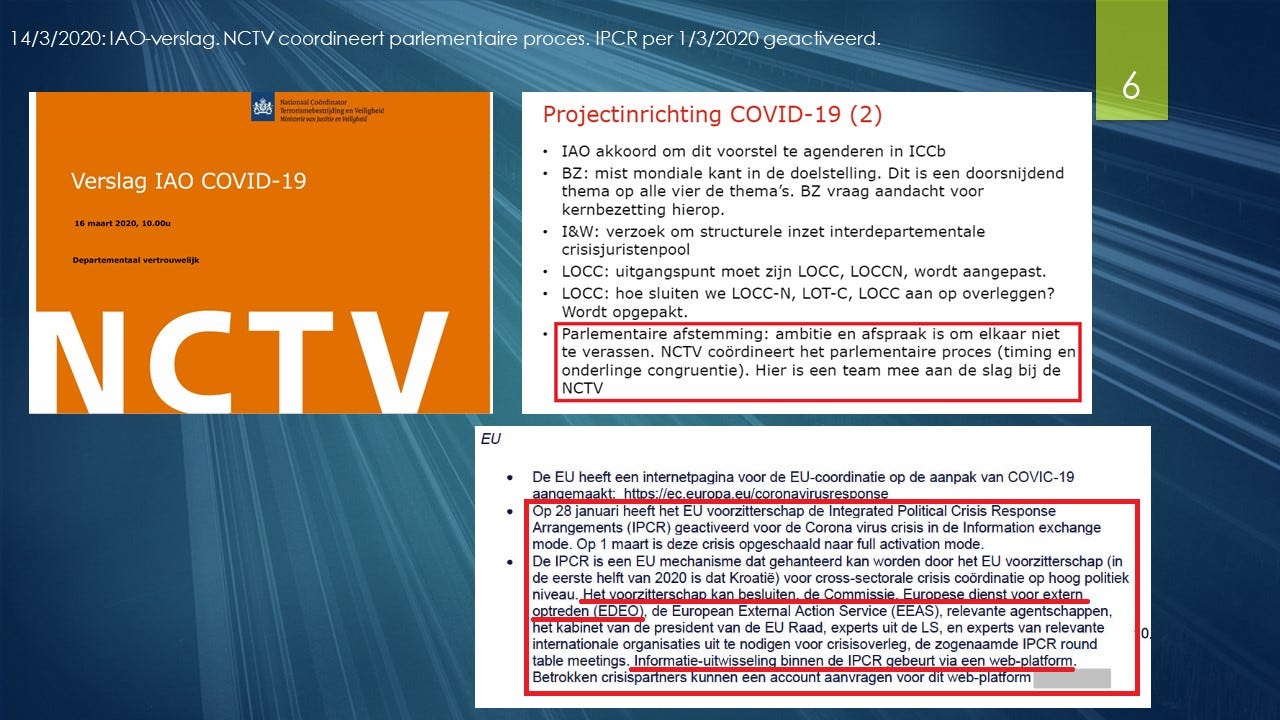


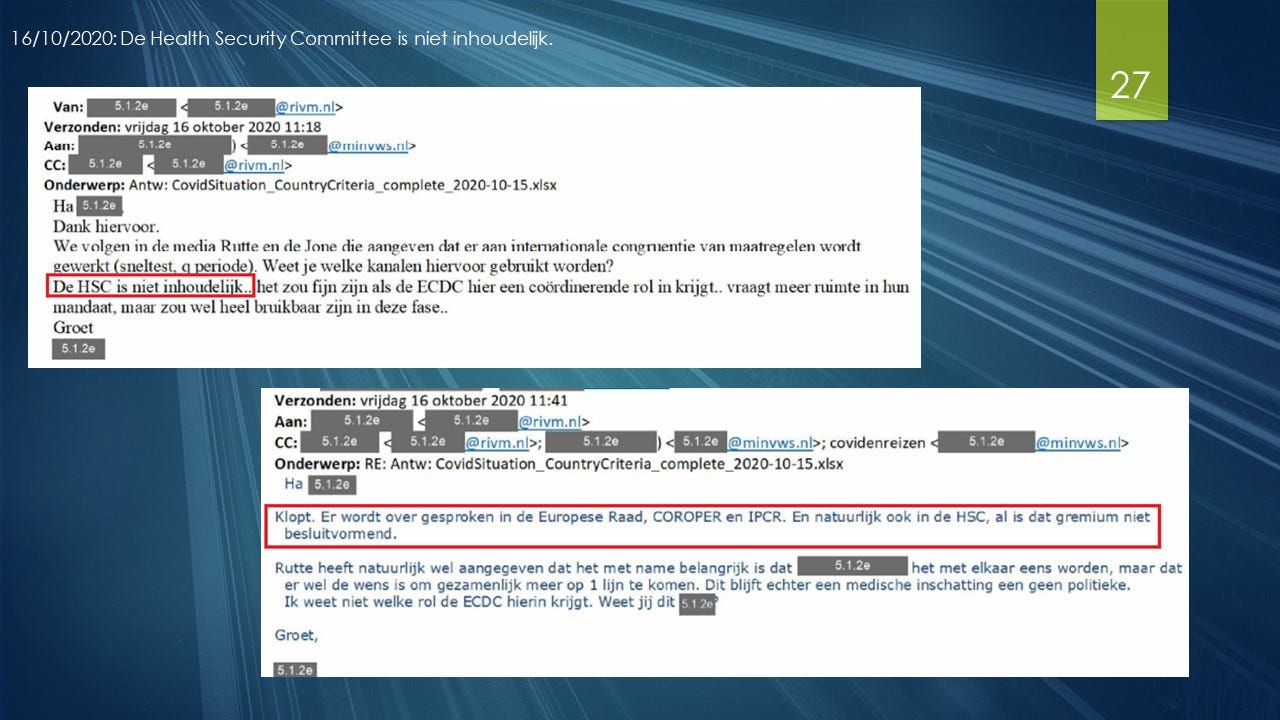


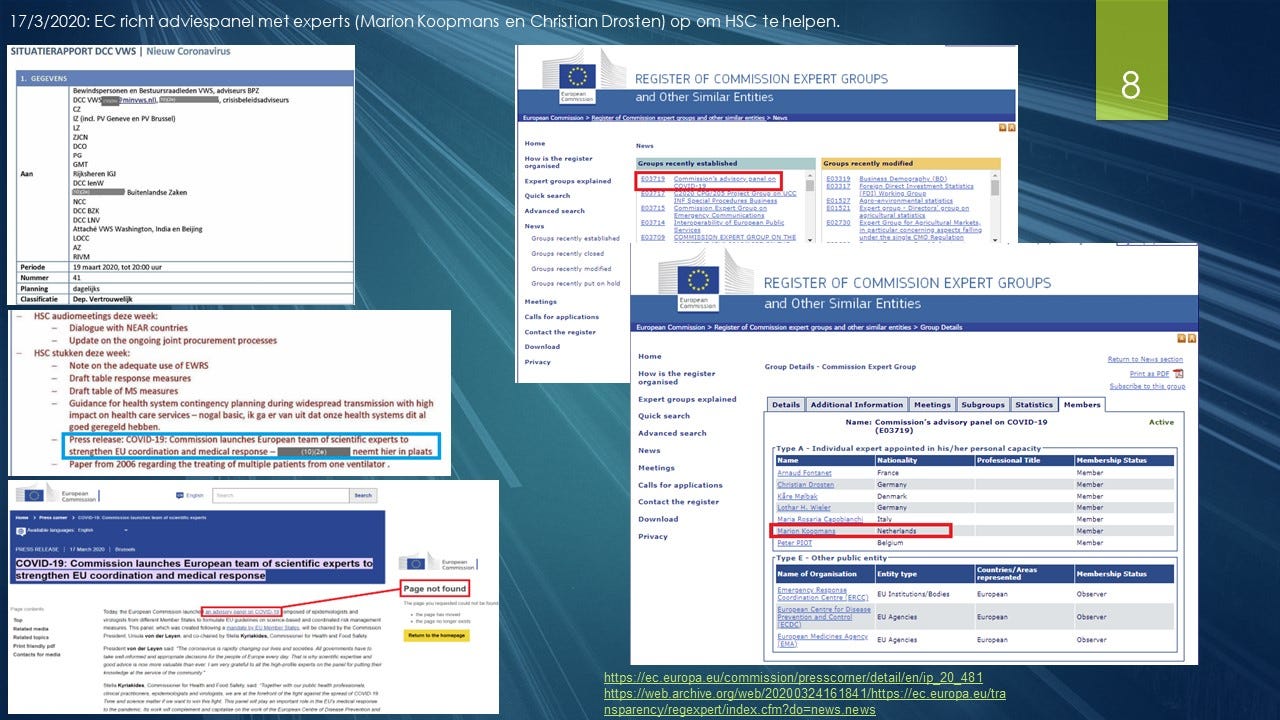
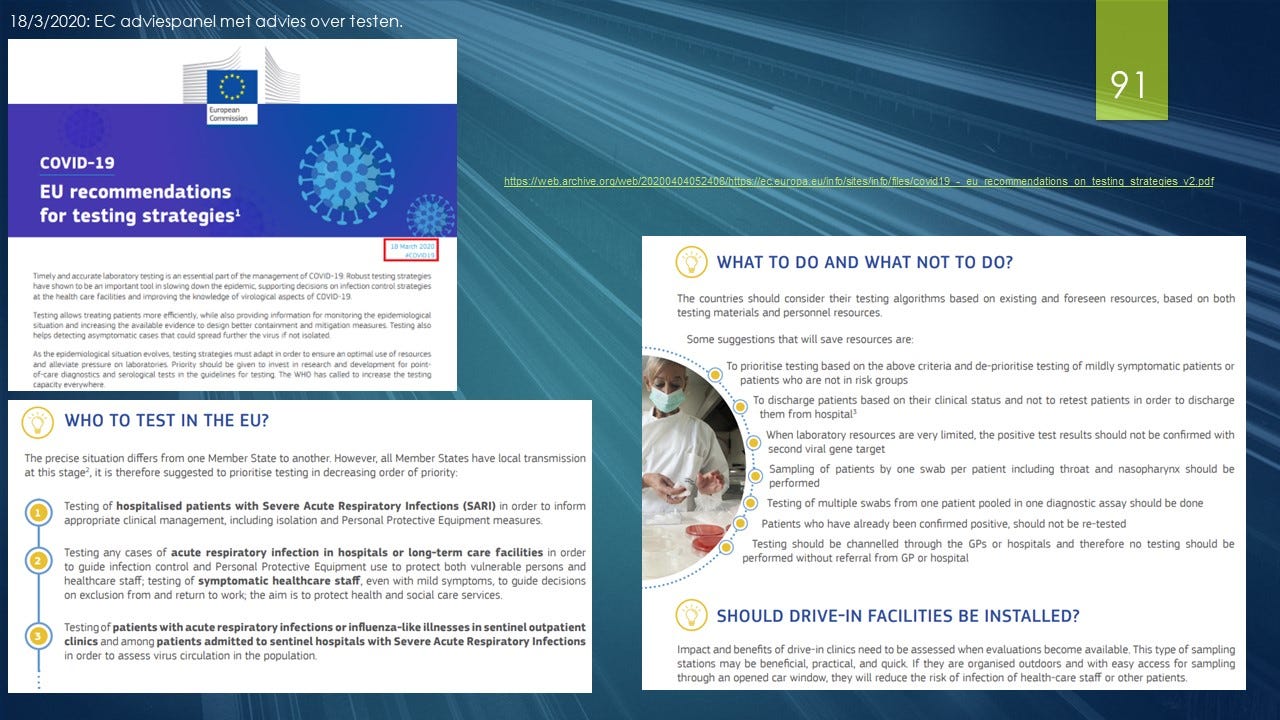
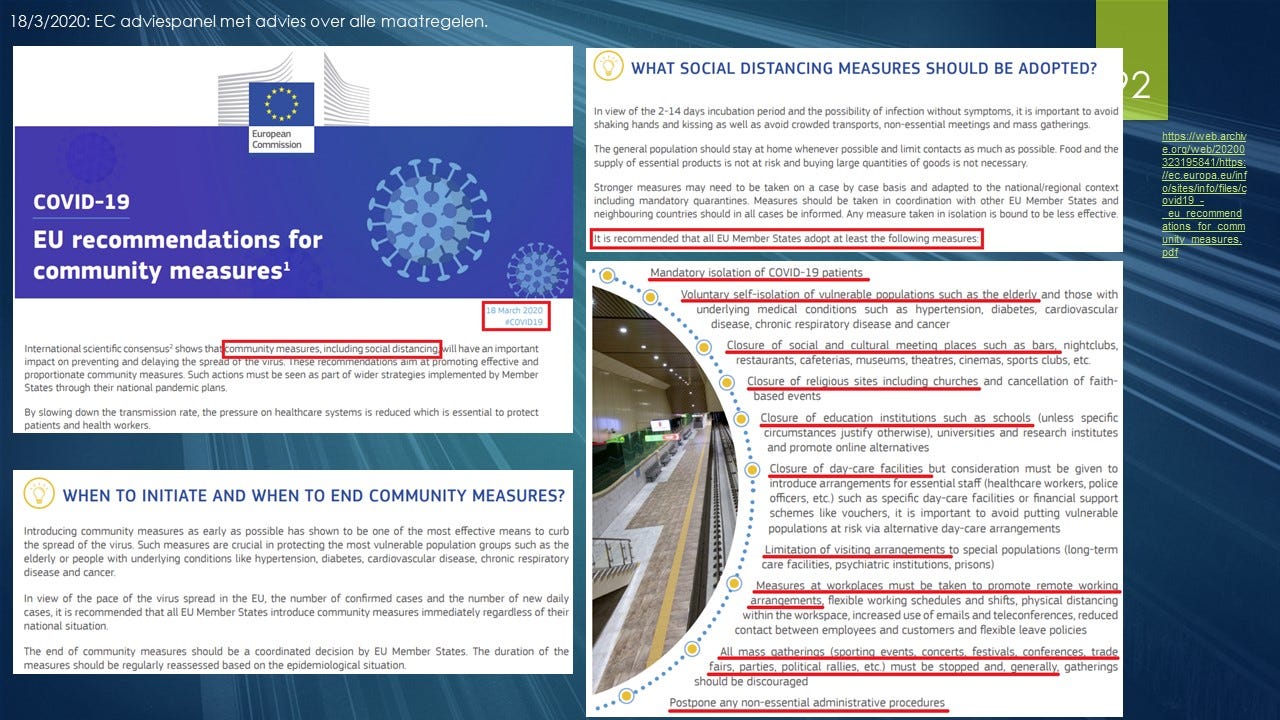
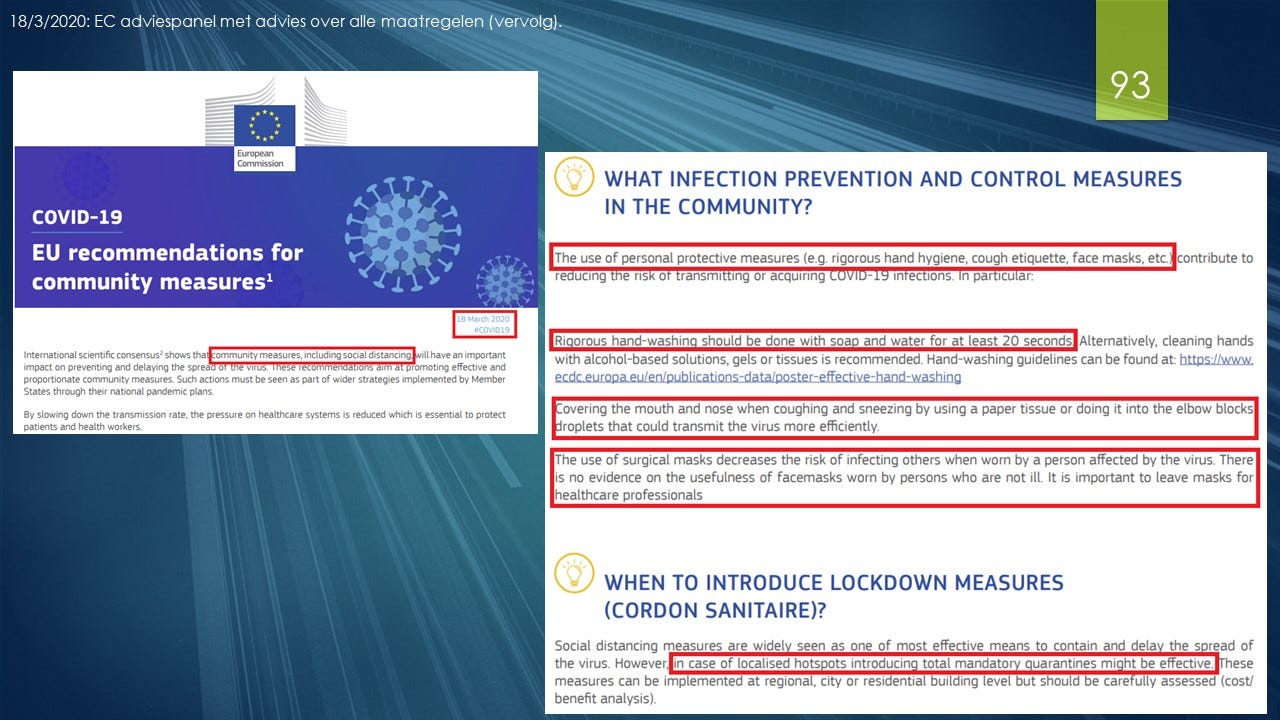
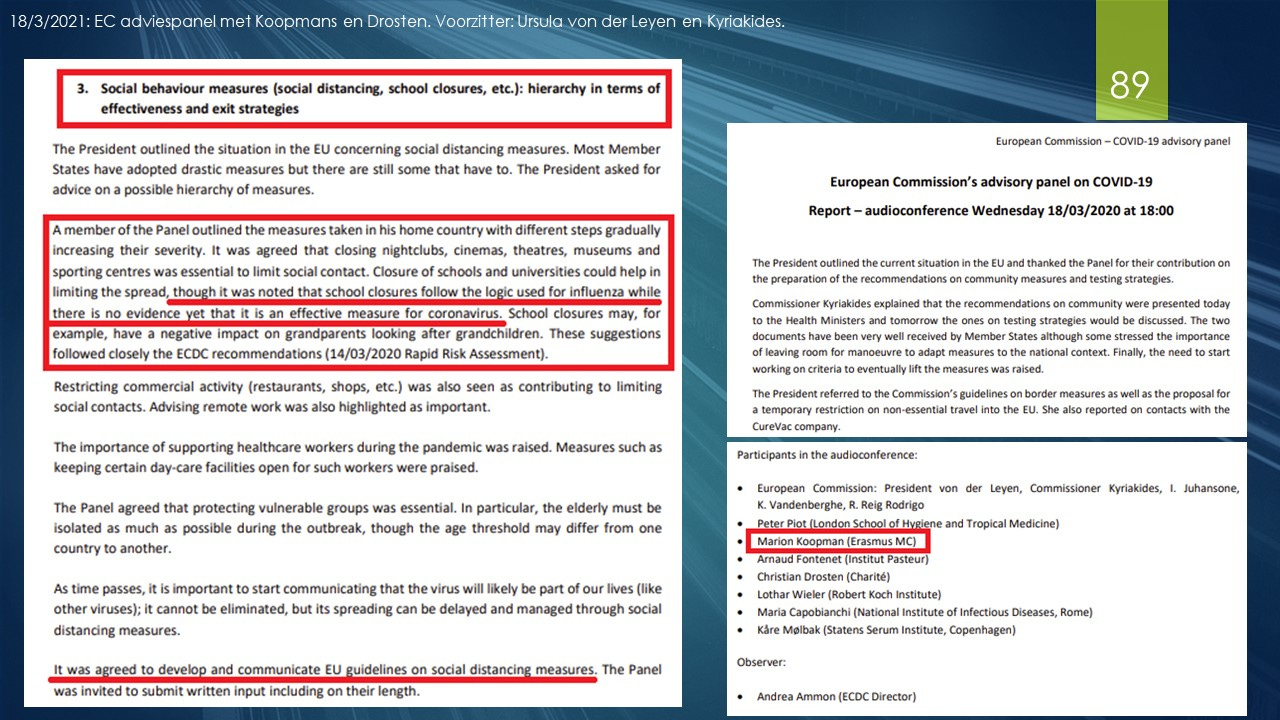

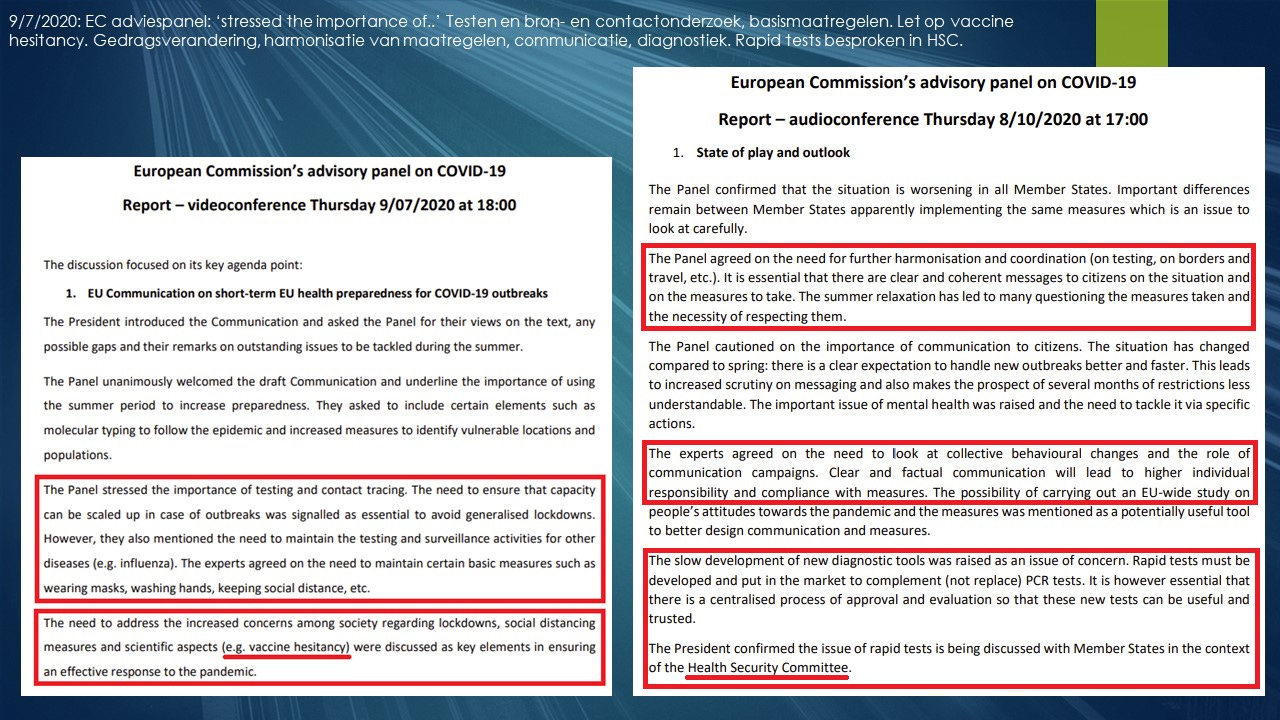
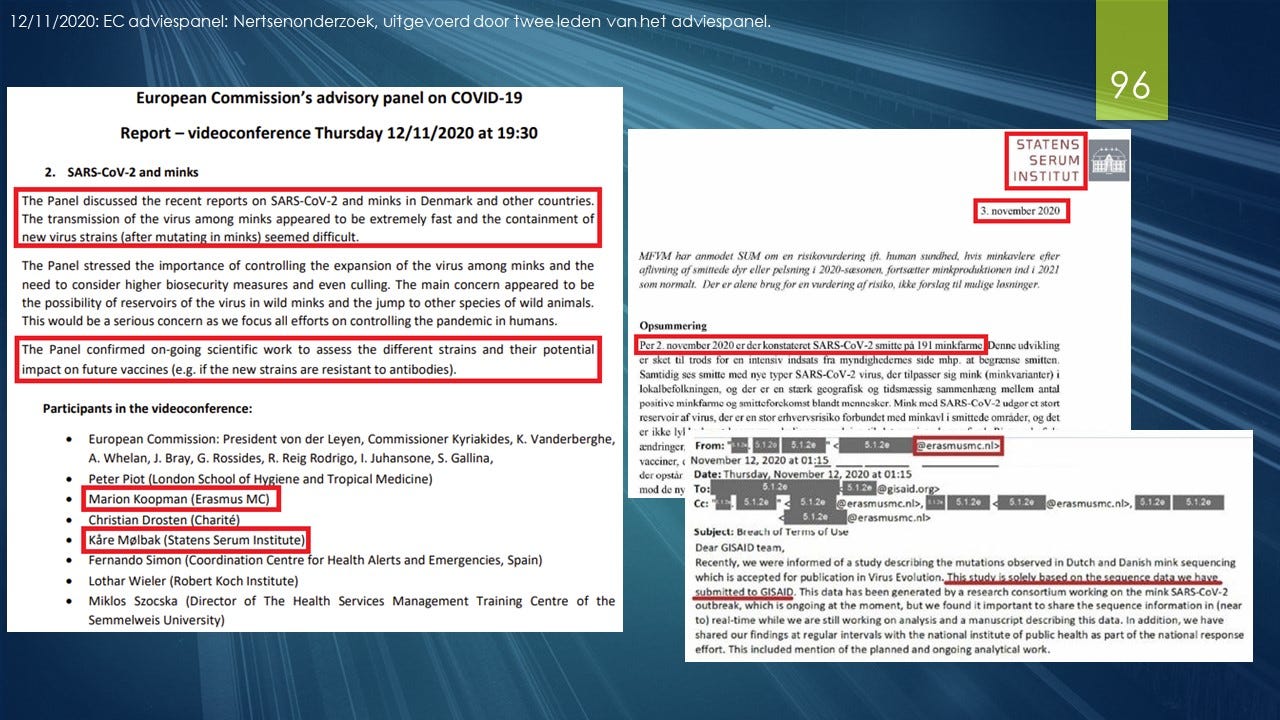
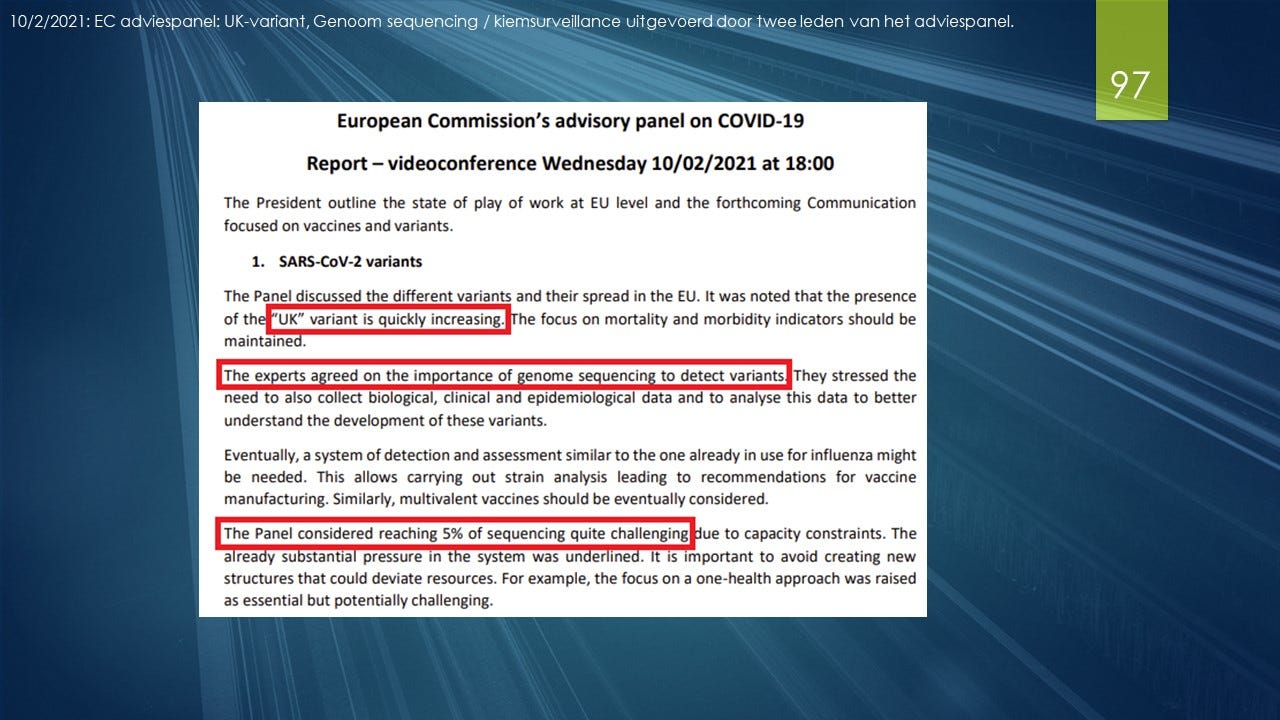
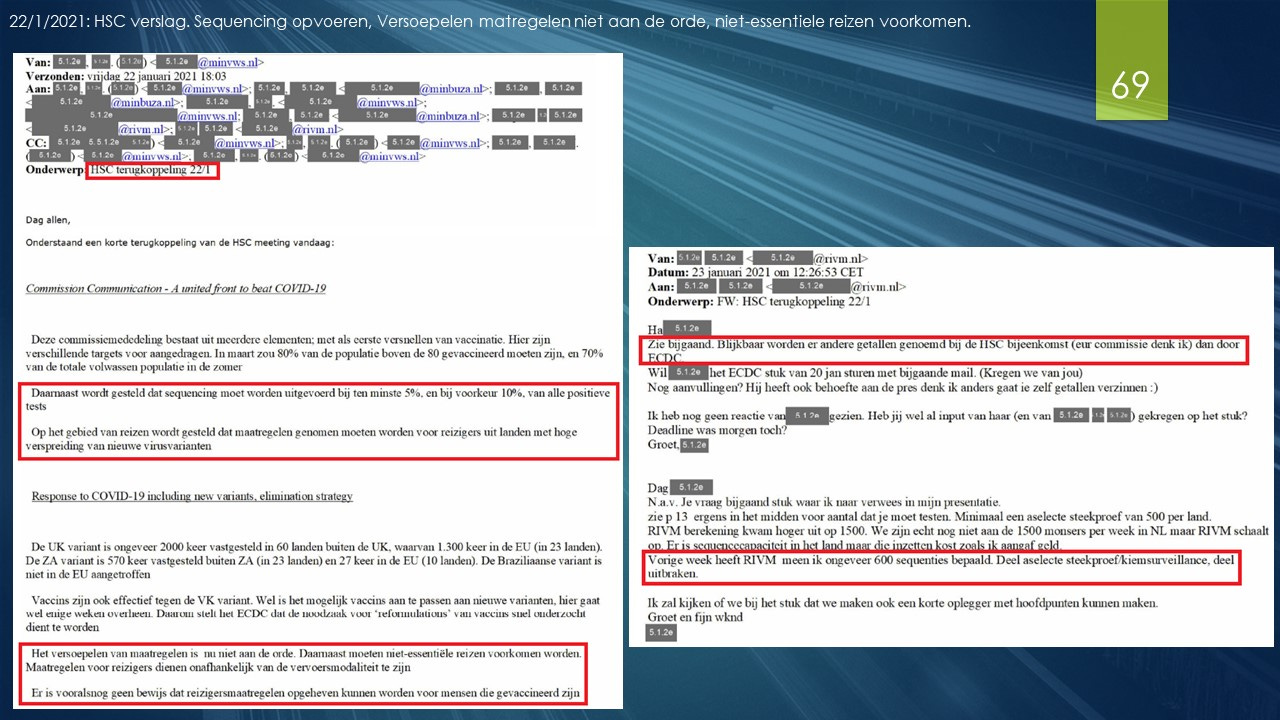

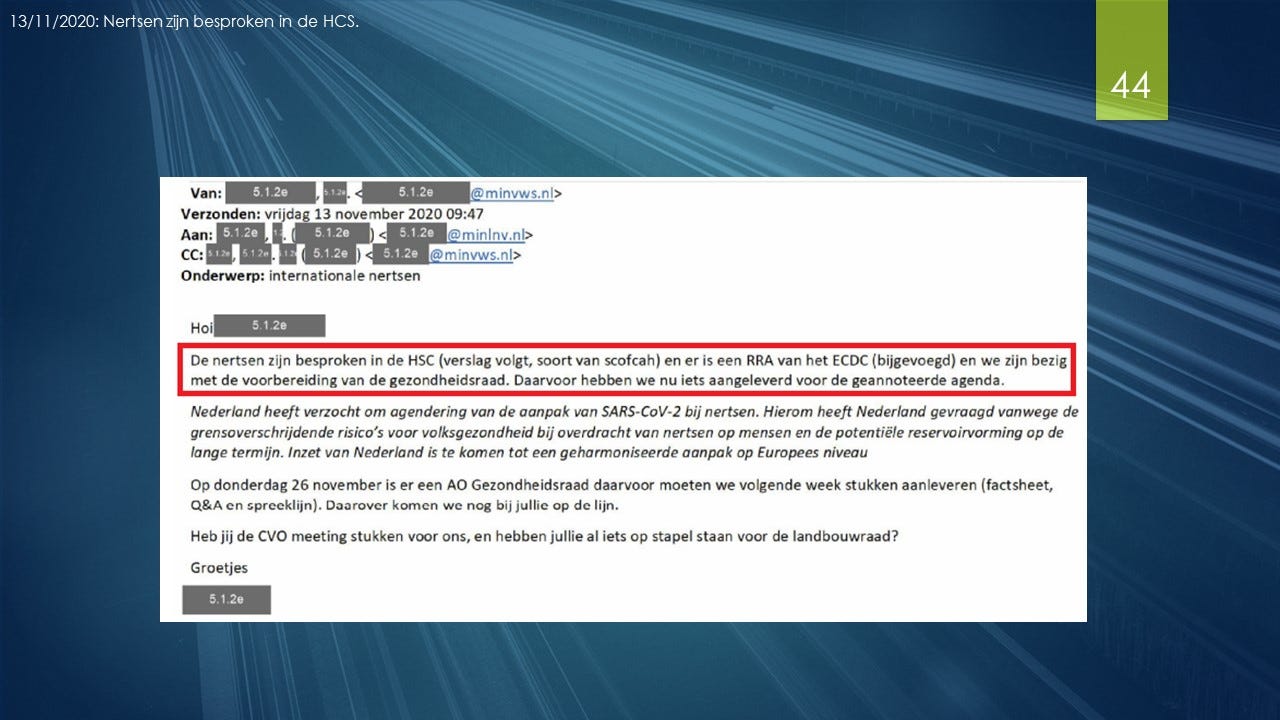

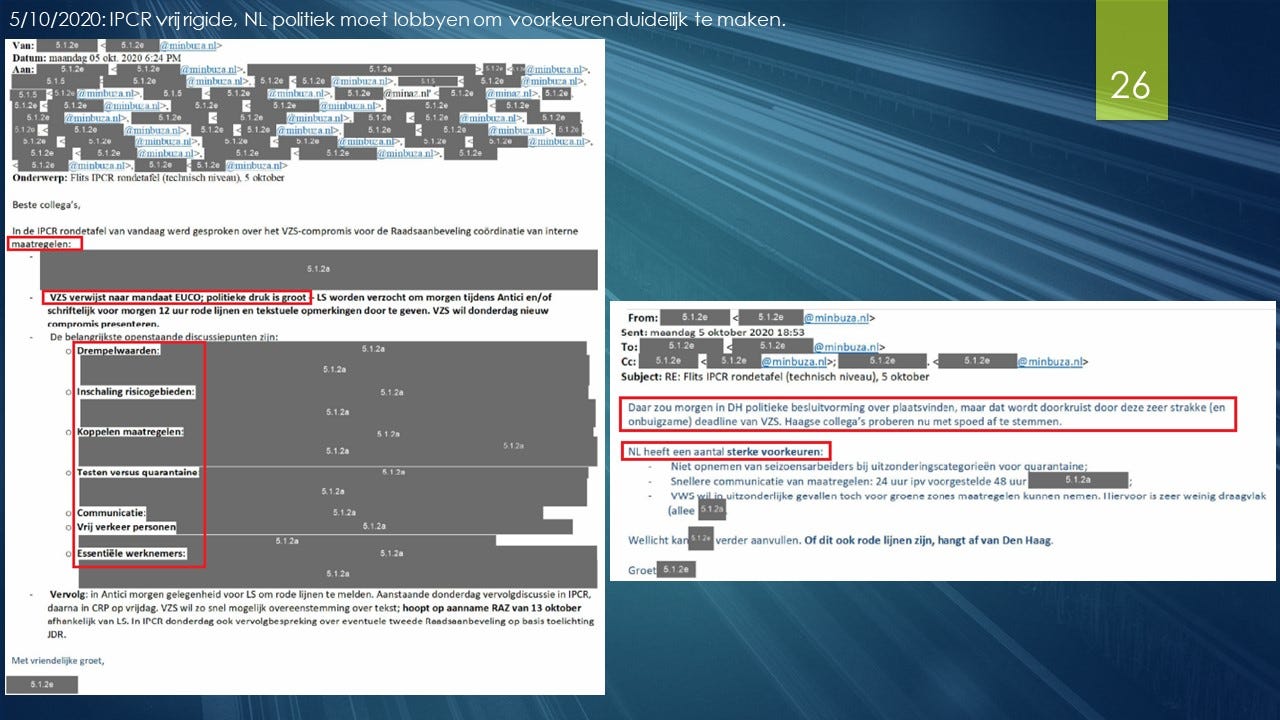
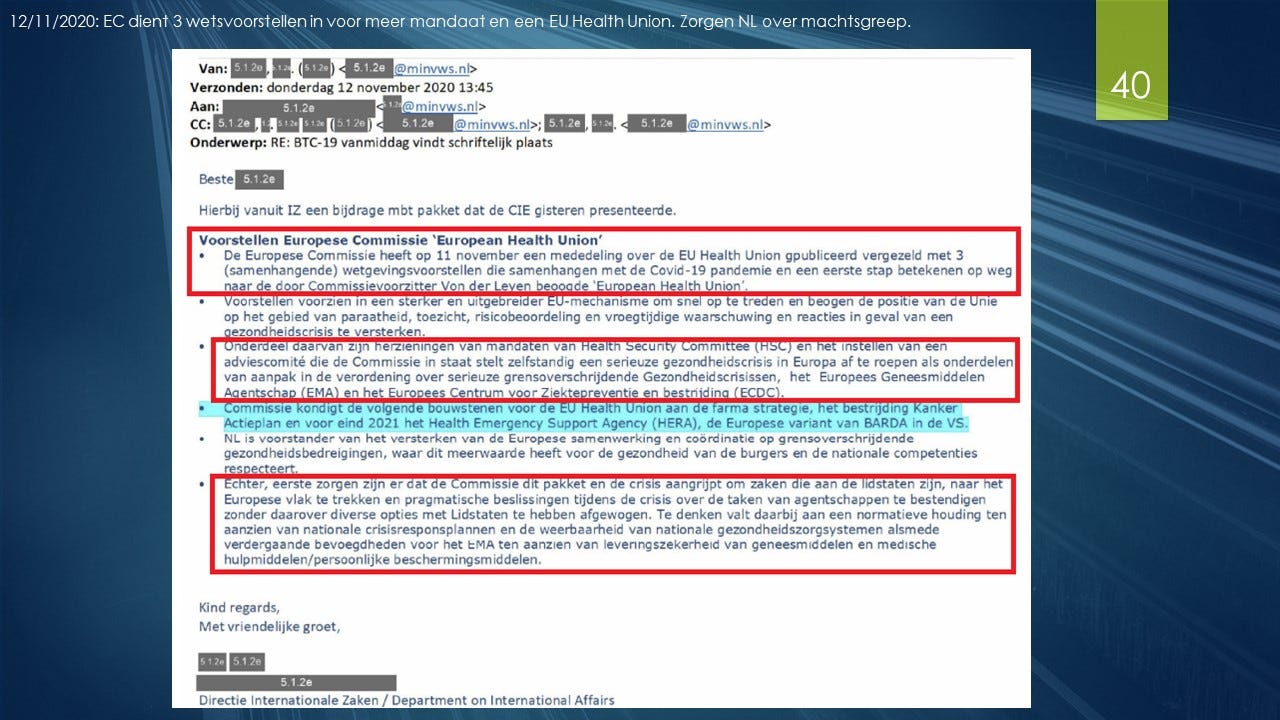

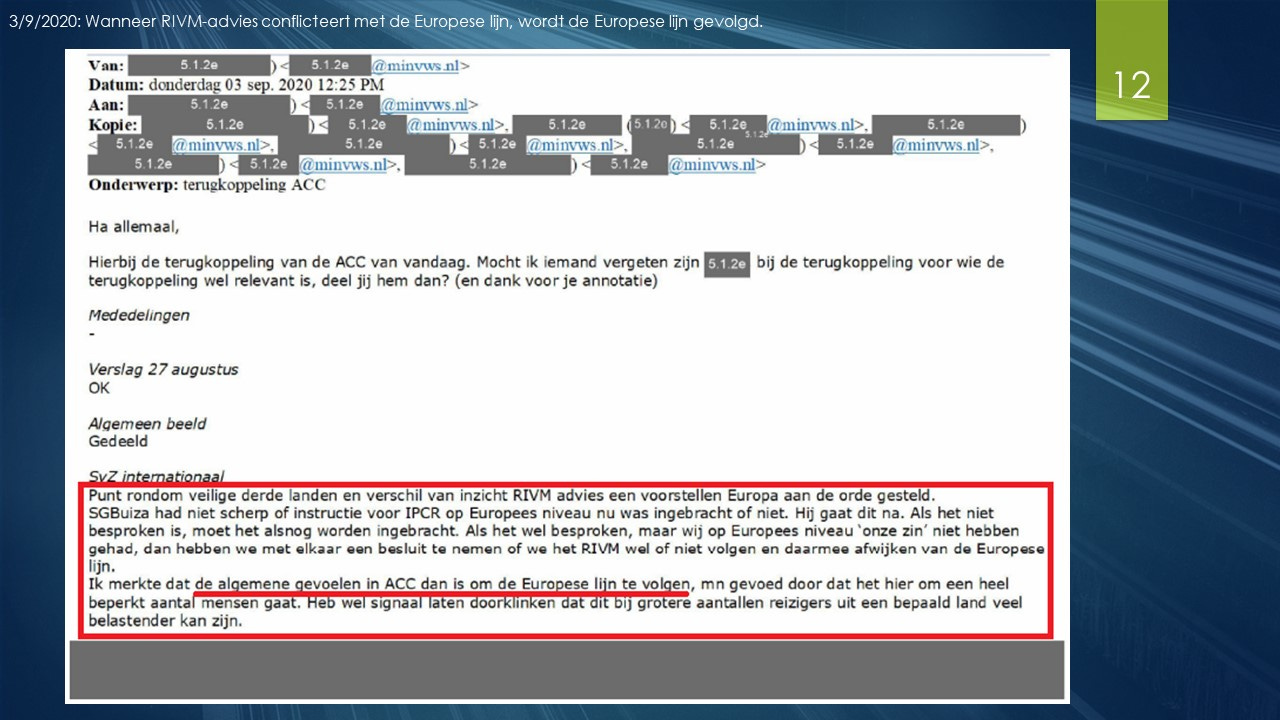


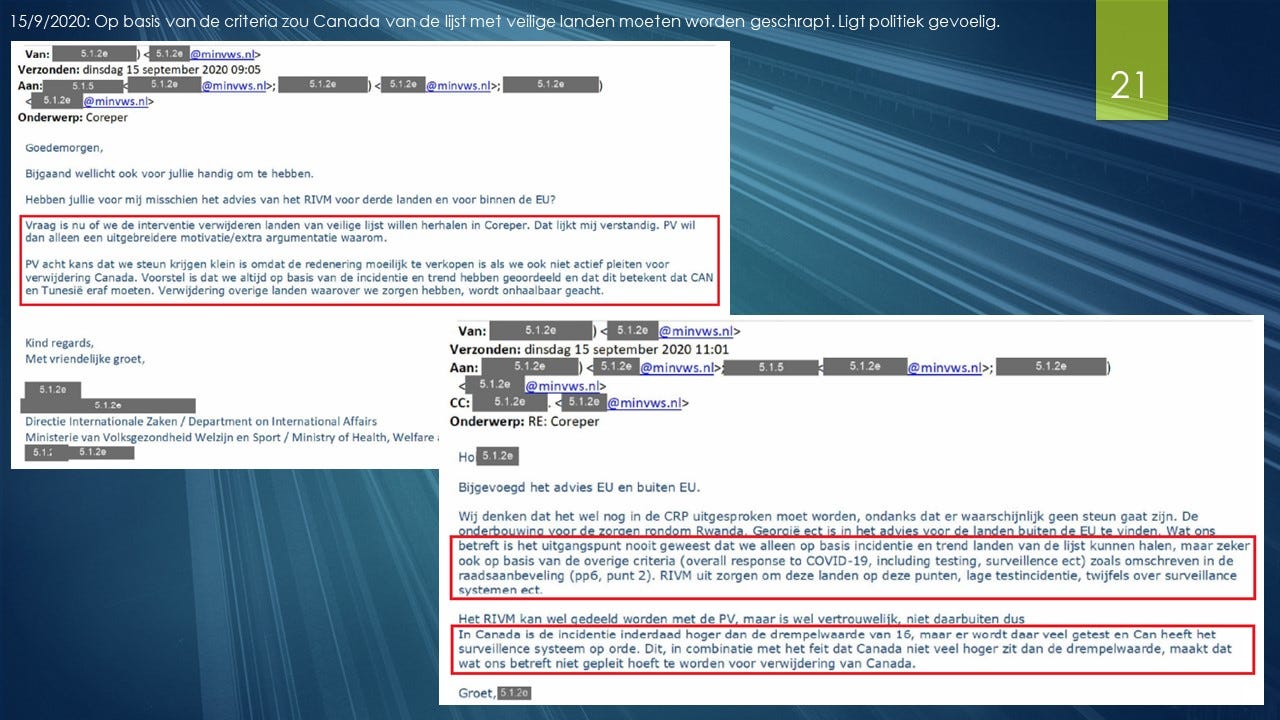


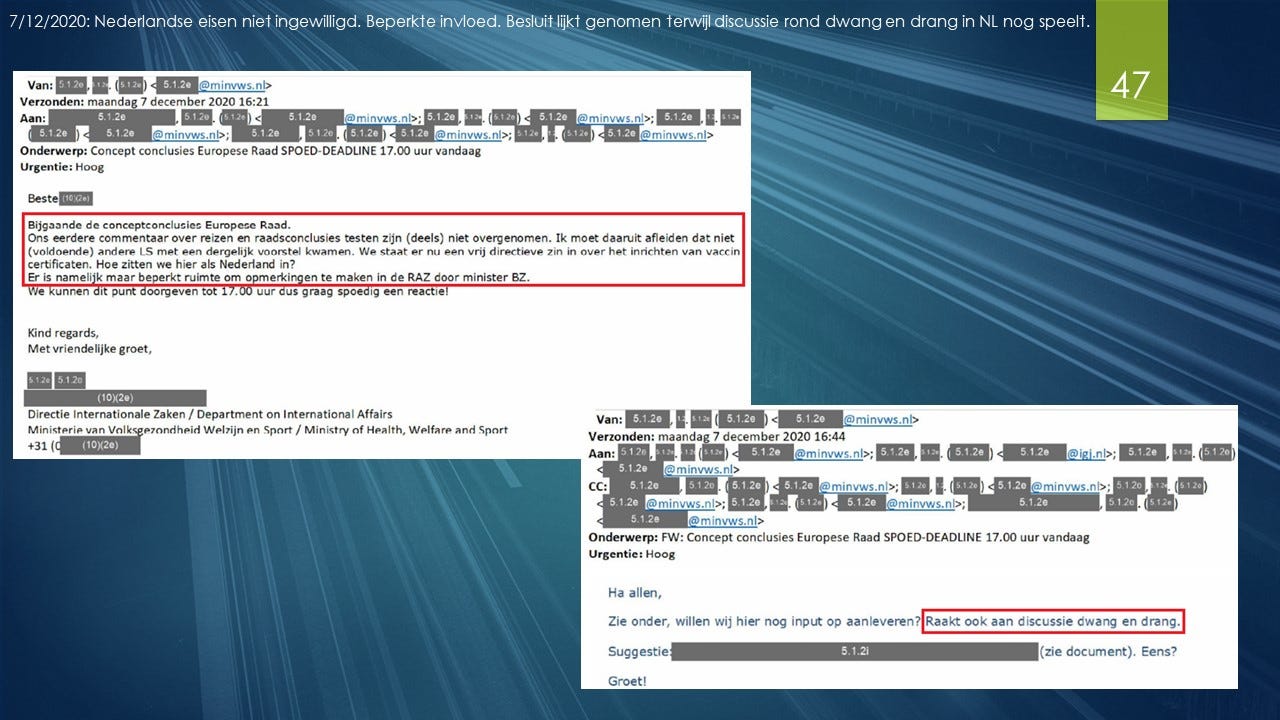




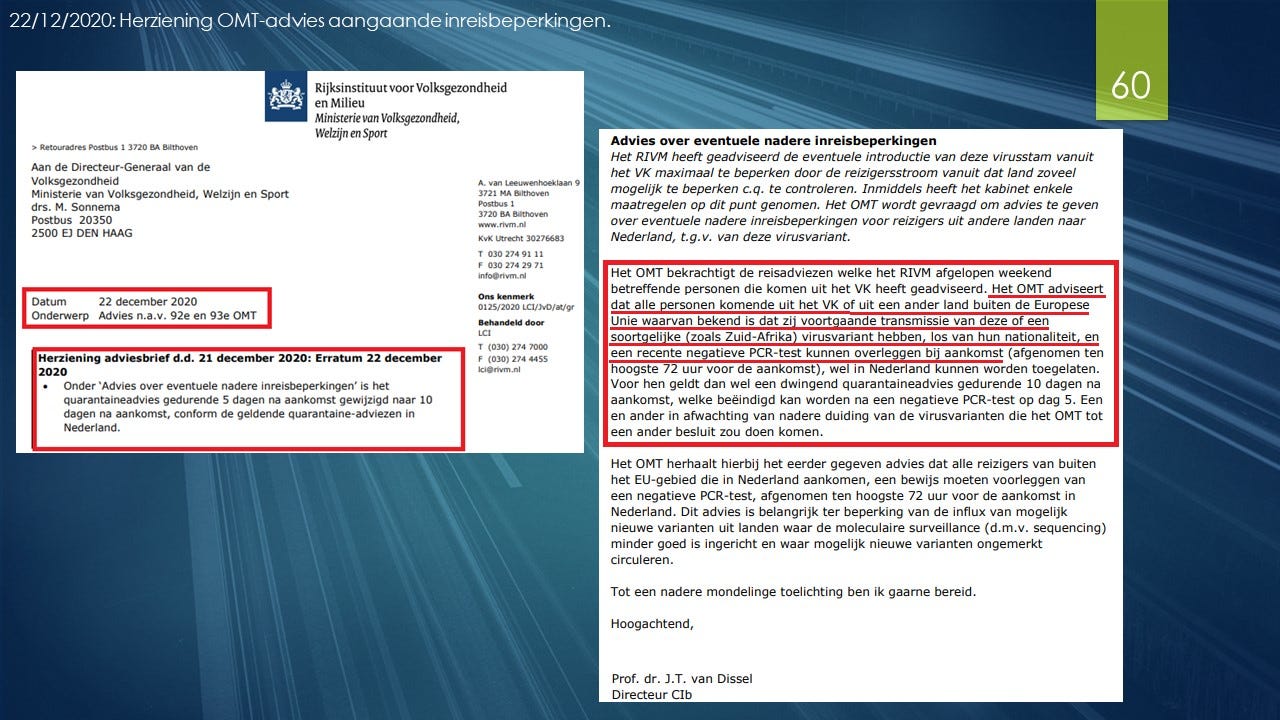
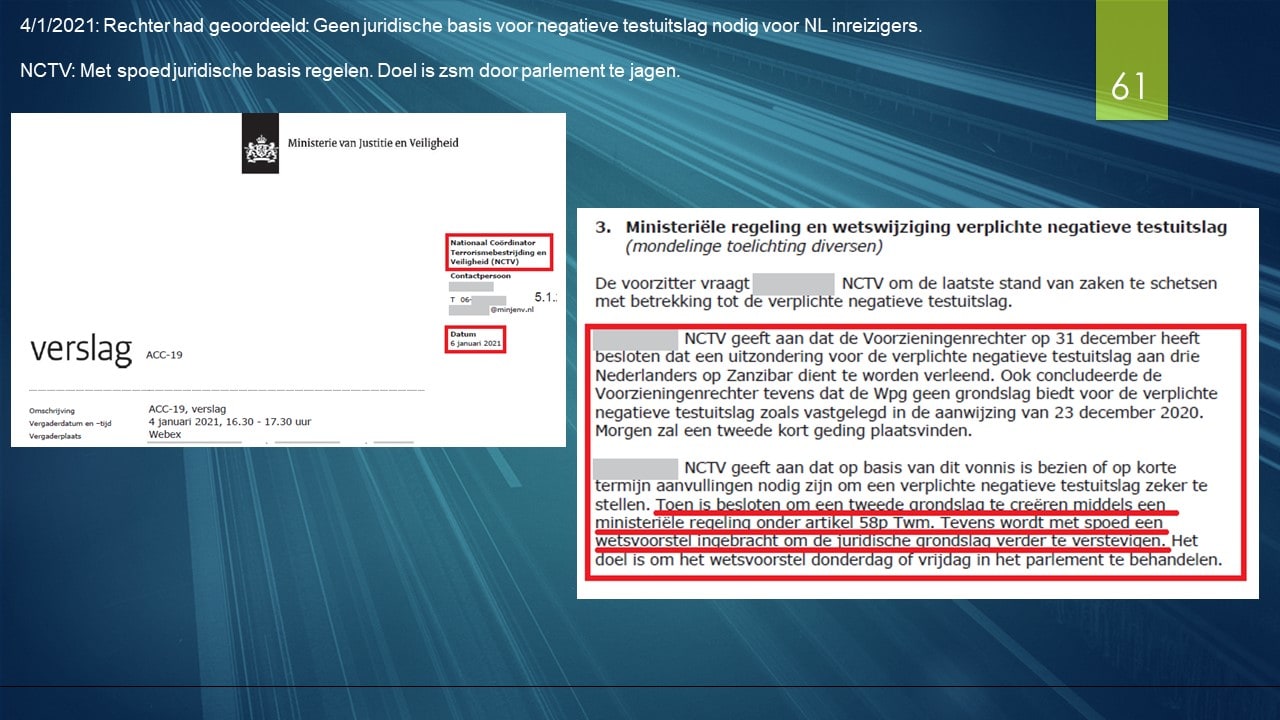
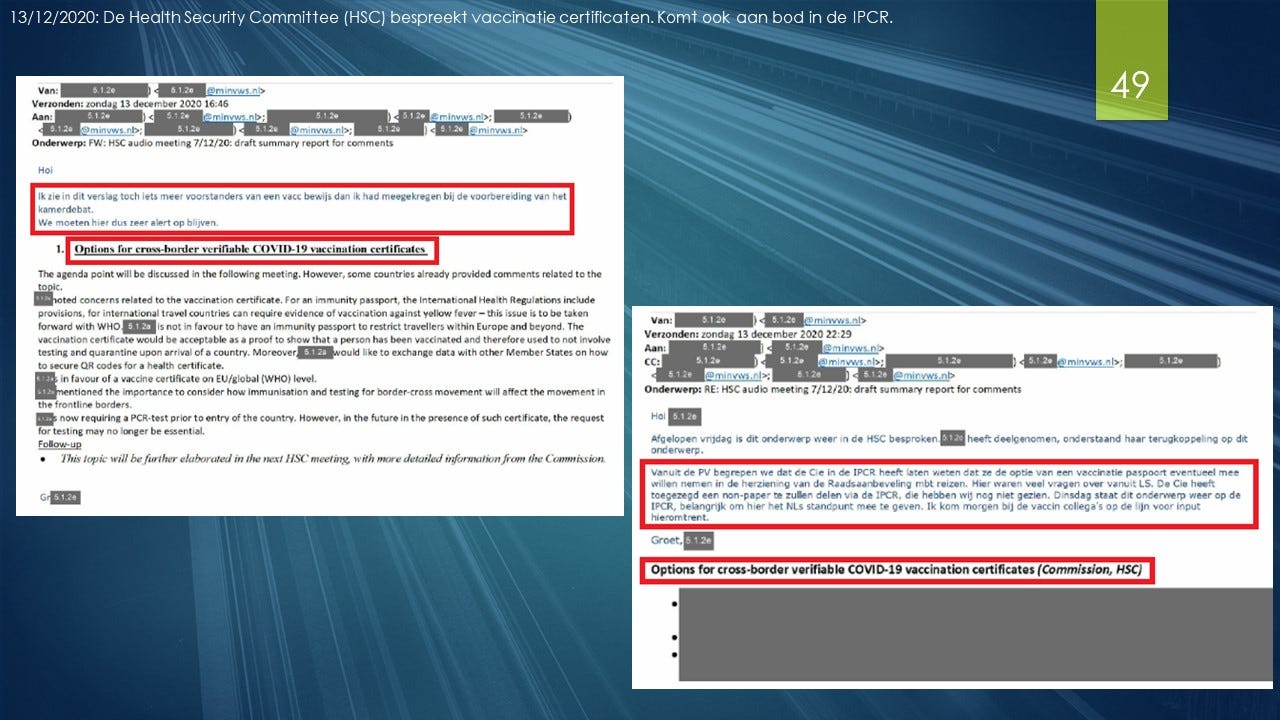
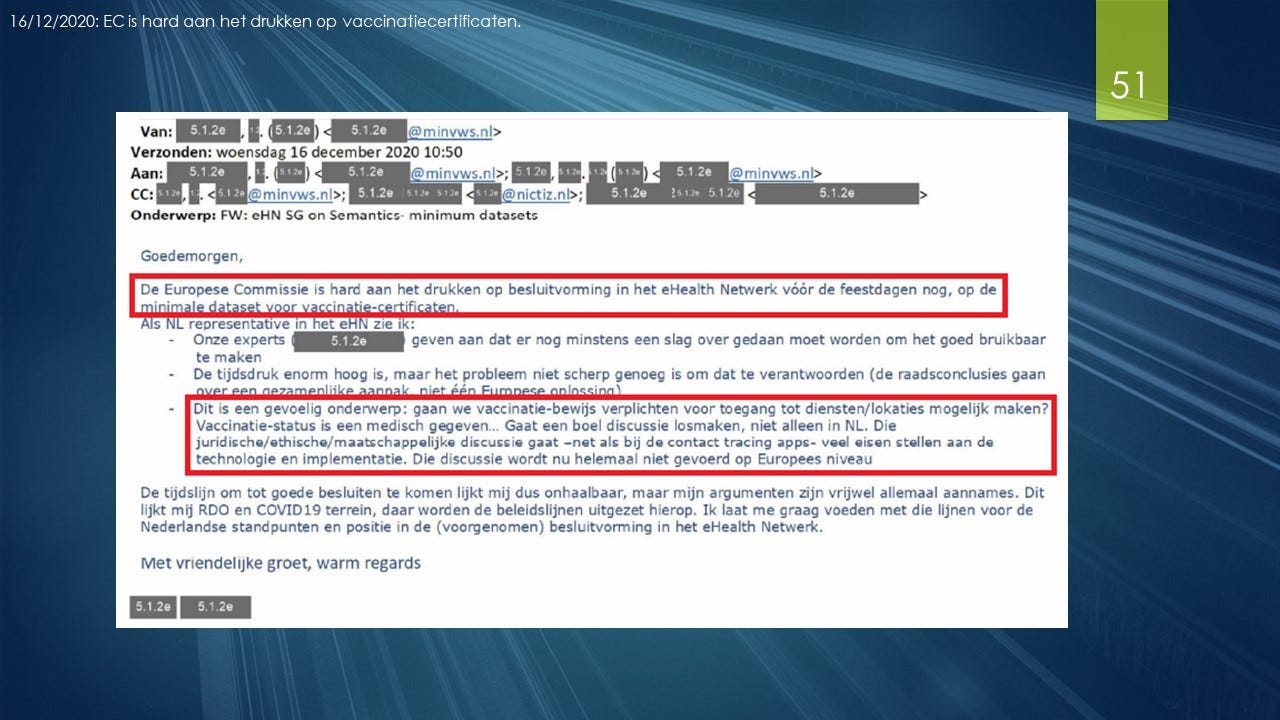

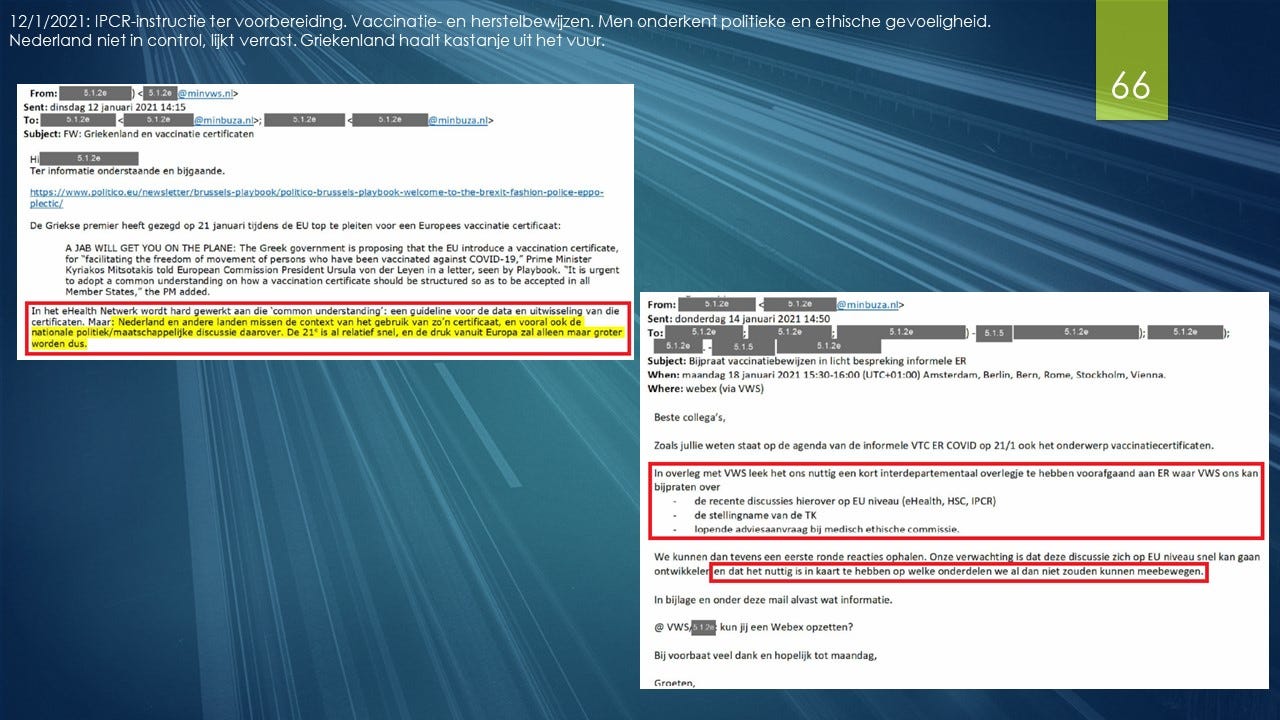
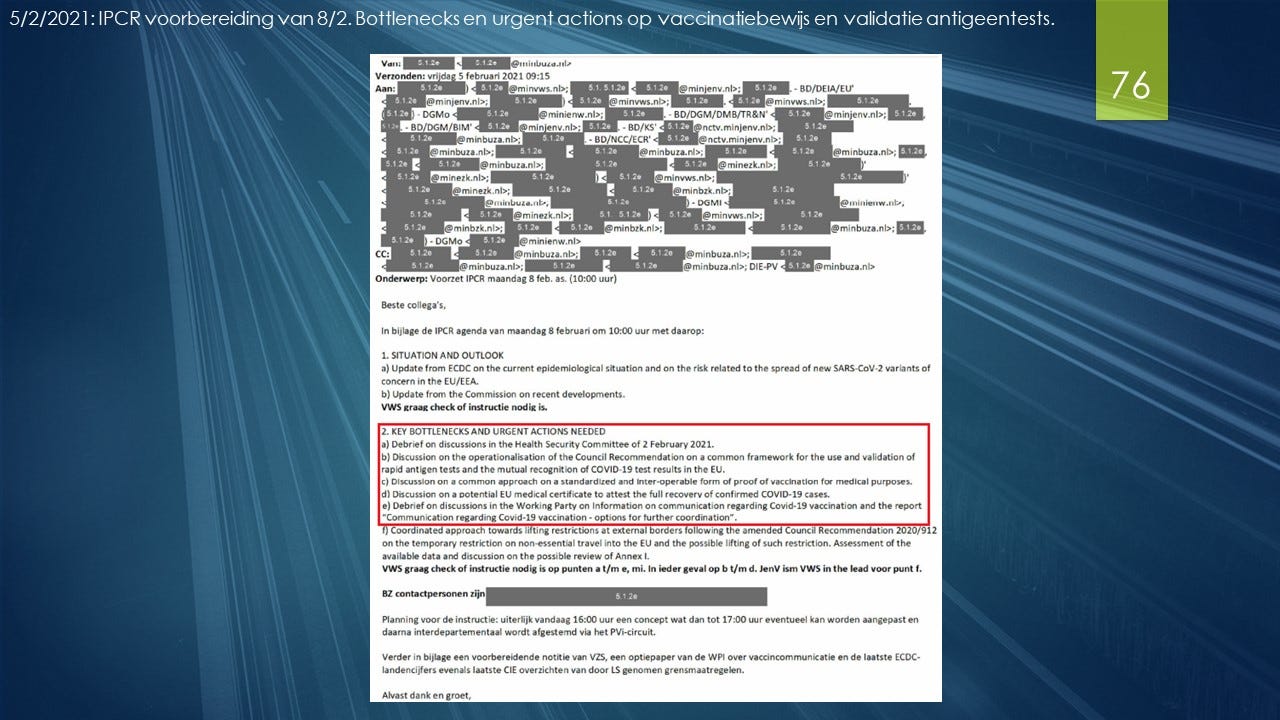
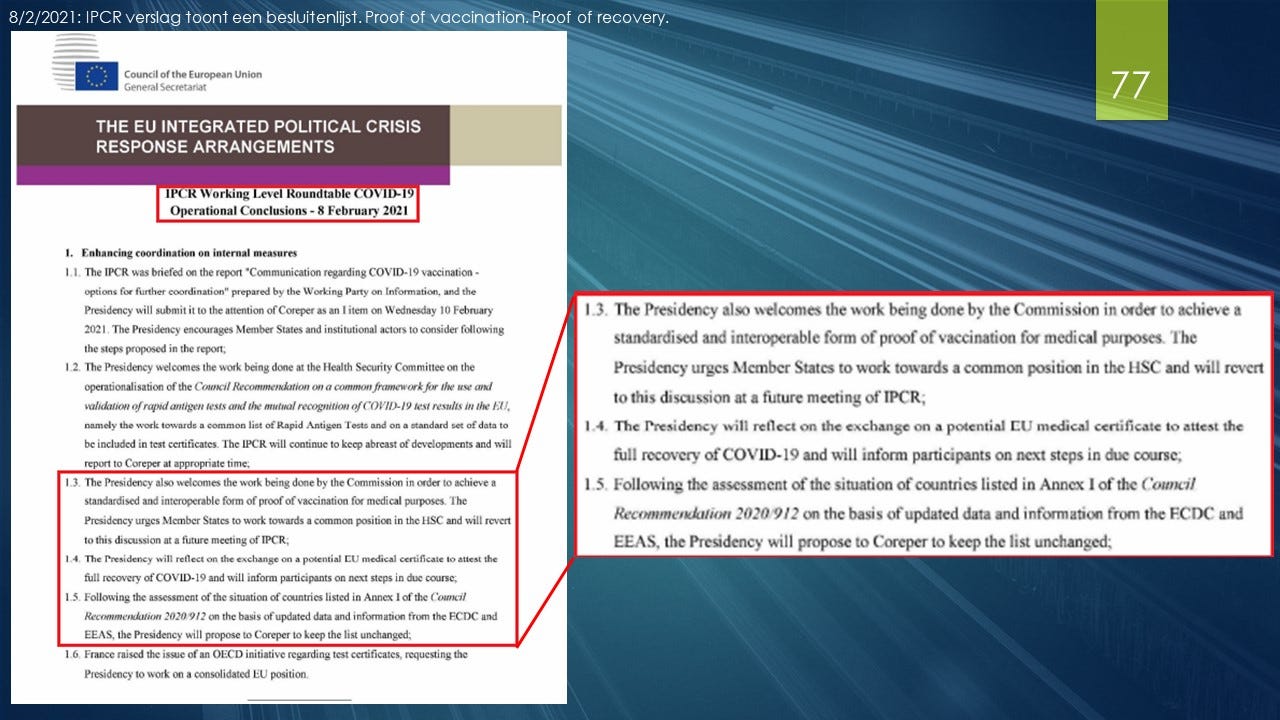
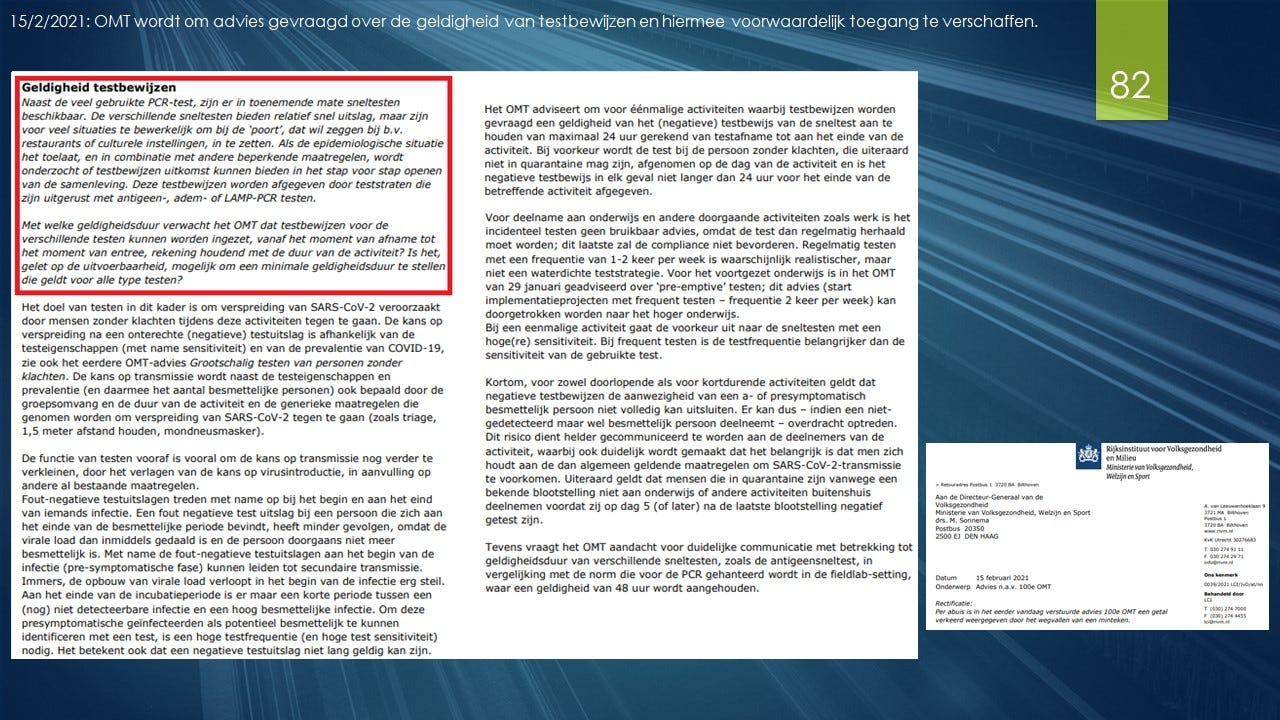
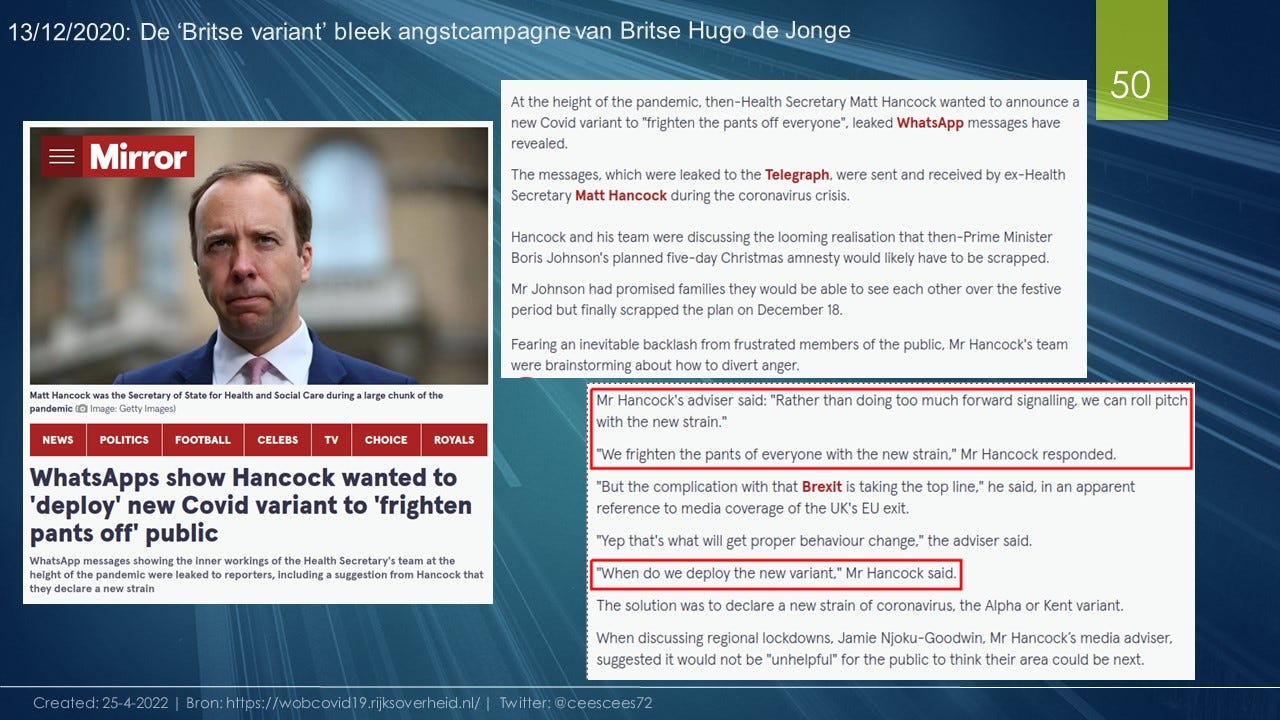
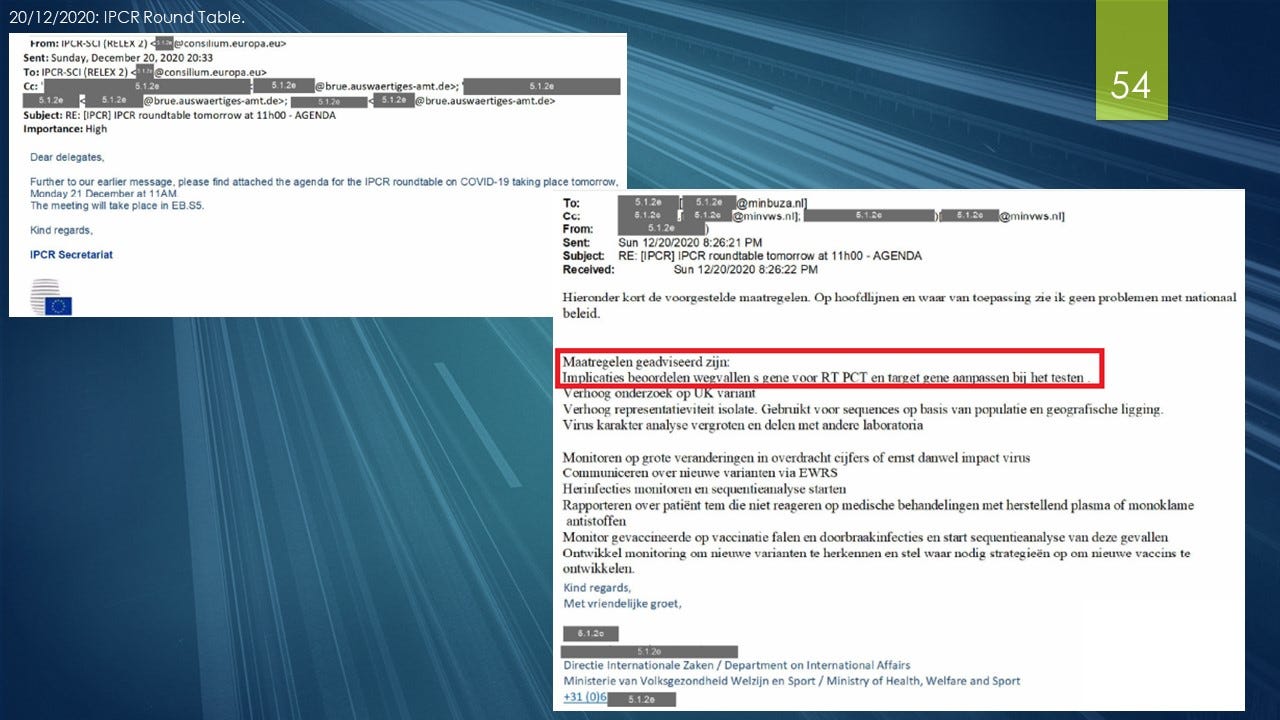


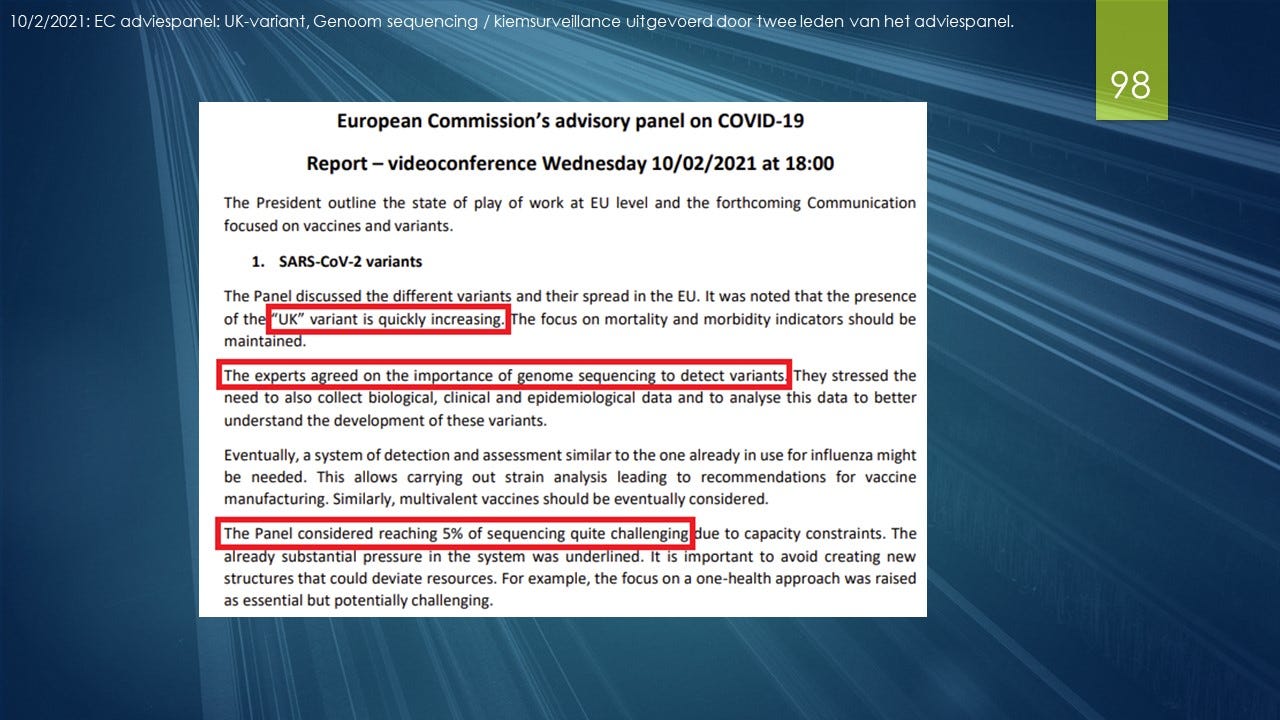
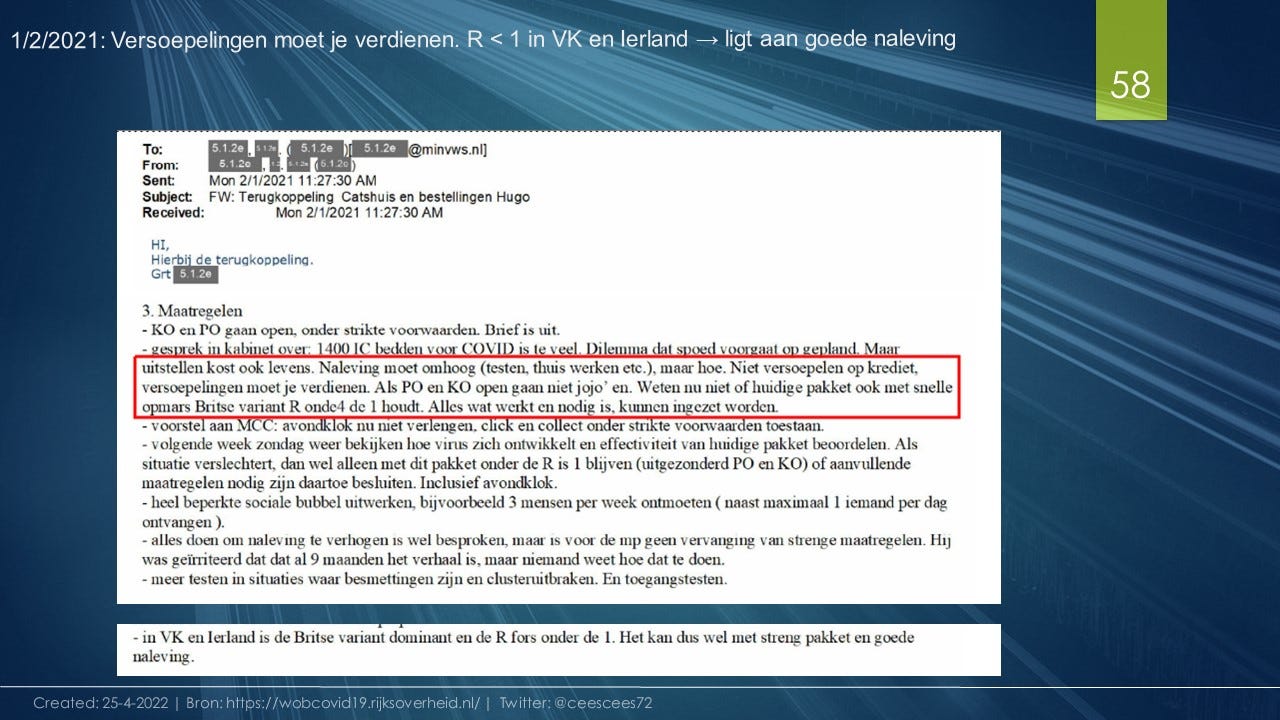
Great article !
The reality is they colluded during this fiasco they created to push the vaccine passports they’d previously decided they wanted implemented. What better excuse to roll them out during a scamdemic and the public to readily accept them.
What was interesting in the uk was how it was down graded to be of no consequence just days before first lockdown.
There was a method in government madness in doing so because if it had remained as it was then they had to make sure working treatment and drugs were available to the public.
Once they downgraded the danger it meant they could remove anything they knew would work and use the opposite treatments that other countries adopted to make breathing and recovery from respiratory illness nigh on impossible if you landed in hospital.